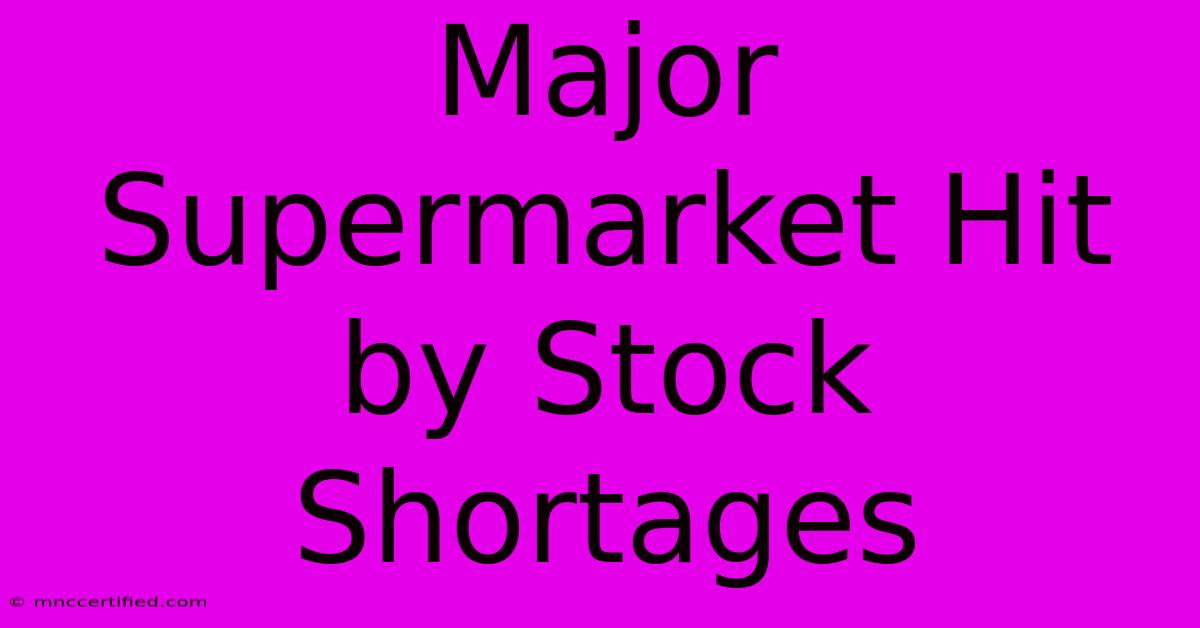Major Supermarket Hit By Stock Shortages

Table of Contents
Major Supermarket Hit by Stock Shortages: What's Causing the Empty Shelves?
Empty shelves are becoming a more common sight in major supermarkets across the country, leaving shoppers frustrated and raising concerns about supply chain issues. This isn't just a temporary blip; it's a complex problem with multiple contributing factors. This article delves into the reasons behind these widespread stock shortages, exploring the impact on consumers and the potential solutions on the horizon.
The Perfect Storm: Multiple Factors Fueling the Crisis
The current situation isn't attributable to a single cause, but rather a confluence of challenges that have strained the supermarket supply chain to its breaking point. Here are some of the key factors:
1. Global Supply Chain Disruptions:
The global supply chain is still reeling from the effects of the pandemic, with ongoing port congestion, shipping container shortages, and geopolitical instability causing significant delays and increased costs. This impacts the timely delivery of goods from overseas manufacturers, leaving supermarket shelves bare. Keywords: supply chain disruptions, global supply chain, shipping delays, port congestion
2. Labor Shortages:
The supermarket industry, like many others, is grappling with significant labor shortages. From warehouse workers to truck drivers and shelf-stockers, a lack of available personnel hinders the efficient movement and distribution of goods. This slows down the entire process, contributing to stock shortages. Keywords: labor shortages, warehouse workers, truck driver shortage, staffing shortages
3. Increased Demand and Inflation:
Consumer demand has remained high, even with inflationary pressures. While people are still buying groceries, they may be buying less of certain items due to increased prices, leading to unpredictable demand patterns that make it challenging for supermarkets to accurately forecast inventory needs. Keywords: inflation, consumer demand, grocery prices, purchasing power
4. Weather Events and Natural Disasters:
Extreme weather events, such as droughts, floods, and hurricanes, can severely impact agricultural production and transportation networks, leading to shortages of fresh produce and other essential goods. These events disrupt harvests and transportation routes, further exacerbating existing supply chain issues. Keywords: extreme weather, natural disasters, drought, floods, supply chain disruption
5. Brexit (UK Specific):
For UK supermarkets, Brexit has added another layer of complexity. New customs checks and trade barriers have increased costs and slowed down the import of goods from the European Union, contributing to stock shortages, particularly for certain fresh produce items. Keywords: Brexit, UK supply chain, import delays, customs checks
The Impact on Consumers: Rising Prices and Limited Choices
These stock shortages have a direct impact on consumers. Beyond the frustration of finding empty shelves, shoppers are facing:
- Higher prices: Reduced supply often leads to increased prices as demand remains high.
- Limited product choices: Consumers might find their preferred brands or types of products unavailable.
- Increased uncertainty: The unpredictability of stock availability can make meal planning and grocery shopping more challenging.
What's Being Done?
Supermarkets are actively trying to address these challenges. Strategies include:
- Diversifying suppliers: Reducing reliance on single suppliers minimizes risk.
- Investing in technology: Improved inventory management systems and data analytics can help predict demand more accurately.
- Improving logistics: Optimizing transportation routes and warehouse operations can enhance efficiency.
- Increased wages and improved benefits: Attracting and retaining employees through competitive compensation packages.
Looking Ahead: A Long-Term Challenge
The current stock shortage crisis is a multifaceted problem with no quick fixes. Addressing the root causes requires collaboration between supermarkets, suppliers, governments, and other stakeholders. Long-term solutions demand a focus on resilience, sustainability, and a more robust, adaptable supply chain. Only through proactive measures can we hope to avoid similar disruptions in the future.
Keywords: supermarket stock shortages, empty shelves, supply chain problems, grocery shopping, inflation, consumer impact, solutions, future outlook
Off-Page SEO Strategies:
- Link building: Reach out to relevant websites and blogs in the food and retail industry to secure backlinks to this article.
- Social media promotion: Share the article on relevant social media platforms to increase visibility and engagement.
- Guest blogging: Write guest posts on other websites in the same niche, including a link back to this article.
- Forum participation: Engage in relevant online forums and communities to promote the article and establish expertise.
This comprehensive approach, combining strong on-page optimization with a robust off-page strategy, will significantly improve the article's chances of ranking well in Google search results.

Thank you for visiting our website wich cover about Major Supermarket Hit By Stock Shortages. We hope the information provided has been useful to you. Feel free to contact us if you have any questions or need further assistance. See you next time and dont miss to bookmark.
Featured Posts
-
Morrisons Faces Supply Chain Issues
Nov 27, 2024
-
Sporting Cp Vs Arsenal Live Stream
Nov 27, 2024
-
Vanderpump Rules Reboot Season 12 Cast
Nov 27, 2024
-
Classic Car Insurance Michigan
Nov 27, 2024
-
British Diplomat Expelled From Russia
Nov 27, 2024